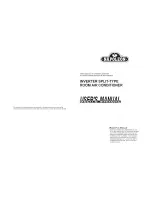
Indoor unit
Wall hole
sleeve (C)
Cut off the
extra length.
Pipe attach-
ment strap
(E)
Use the wall hole sleeve
(C) to prevent indoor/
outdoor connecting wire
(A) from contacting metal
parts in the wall and to
protect the wiring from
rodents.
Wall hole cover (D)
Attachment screw (F)
Outdoor unit installation
2-13/16 in. (70
mm) or more/
5-1/8 in. (130 mm)
or more for left and
left back piping
(using spacer)
1-4. INSTALLATION DIAGRAM
ACCESSORIES
Check the following parts before installation.
<Indoor unit>
(1) Installation plate
1
(2)
Attachment screws for the installa-
tion plate
4 × 25 mm
7
(3) Remote controller holder
1
(4)
Screws for the remote controller
holder
3.5 × 16 mm (Black)
2
(5) Battery (AAA) for (6)
2
(6) Wireless remote controller
1
(7)
Felt tape
(For left or left-rear piping)
2
(8)
2
(9) Charge nut
1
(10) L-joint
1
FIELD-SUPPLIED PARTS
(A)
Indoor/outdoor unit connecting wire
*1
1
(B)
Extension pipe
1
(C)
Wall hole sleeve
1
(D)
Wall hole cover
1
(E)
Pipe attachment strap
2 to 5
(F)
Screw for (E) 4 × 20 mm
2 to 5
(G)
Piping tape
1
(H)
Putty
1
(I)
Drain hose
(or soft PVC hose, 19/32 in. [15
mm] inner diameter or hard PVC
pipe VP16)
1
(J)
Refrigerant oil
1
(K)
Power supply cord
*1
1
Units should be installed by licensed contractor
according to local code requirements.
Note:
*1
Place indoor/outdoor unit connecting wire
(A) and power supply cord (K) at least 3 ft.
(1 m) away from the TV antenna wire.
Unit: inch
Unit: mm
4-11/16 in.
(120 mm)
or more
Space for indoor unit working
Please leave the space as shown in the
picture for maintenance usage.
After the leak test, apply insulating mate-
rial tightly so that there is no gap.
33-1/16
14-3/16
19-11/16
Air inlet
3-15/16
15-14/32
13
Air outlet
4-3/8 x 13/16 slot
1-18/32
40
840
100
500
Air inlet
392
330
360
Air outlet
4-10 x 21 slot
When the piping is to be attached to a wall
comprised of tin plate or metal netting, use
chemically treated wooden piece 25/32 in.
(20 mm) or thicker between the wall and
the piping, or wrap insulation vinyl tape 7 to
8 turns around the piping.
To use existing piping, perform COOL
operation for 30 minutes and pump down
before removing the old air conditioner.
Z" \ "
for new refrigerant.
5/16 in. (7 mm) or more
4 in.
(100 mm)
or more
4 in.
(100 mm)
or more
14 in.
(350 mm)
or more
20 in.
(500 mm)*3
or more
Note:
Do not
obstruct
the air
outlet.
Indoor unit
Installation
plate
Space
9-27/32 in. (250
mm) or more
4 in. (100 mm)
or more
8-11/16 in.
(220 mm)
or more
clear *2
*2
20 in. (500 mm) or more when
front and sides of unit are clear
*3
When any 2 sides of left, right
and rear of unit are clear
Seal the wall hole
gap with putty (H).
Attach the pipe to
wall with pipe at-
tachment strap (E).


























